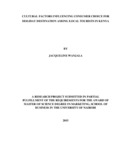| dc.description.abstract | The study sought to address the influence of cultural factors influencing choice for a holiday destination for local tourists in Kenya. The cultural dimensions guiding the study were collectivism- individualism, uncertainty avoidance, power distance and masculinity. Cultural differences cannot be avoided but rather understanding what and how the desire and willingness of the tourists as well as their behavior is an important factor to the success of domestic tourism. Tourism is one of the key drivers to Kenya’s socioeconomic development. The country places more emphasis on tourism identifying it together with manufacturing and trade as the main drivers of the economy. It generates approximately an average of 10% of the country’s GDP and 9% of total formal employment. However, the sector has declined in the recent past due to the effects of terrorism. There is need to encourage domestic tourism as a way of cushioning the tourism sector against occasional fluctuations. A study in culture would therefore identify Kenyans’ perceptions towards local tourism. The research objective of the study was to establish the influence of culture on consumer purchase decision of a holiday destination in the tourism industry in Kenya. The study was approached by descriptive design whereby the target population was shoppers at the Village Market and Junction Mall as they walked in and out of various shop units. The sample size of the study was 384 while data collection tool used was questionnaire. Data analysis was both descriptive and inferential. Results of the study indicate that most holiday makers have collectivist traits by valuing in-group goals but negatively correlated, and not significant to decision making of a holiday package. The second outcome was that uncertainty avoidance had a negative and significant effect on the choice of holiday destination. The results lead to the conclusion that safety concerns, cost; both direct and indirect and extreme weather affect the choice of holiday destinations for individuals in Kenya. In order to minimise uncertainty, holiday makers will search for the information extensively through internet and relevant travel websites. The third outcome of the study was that power distance had a positive but non significant effect on the choice of holiday destination. The study recommends that that marketer should take note of the fact that uncertainty avoidance is a significant determinant of the choice of holiday destinations in Kenya. In this case, the government through the concerned ministry should ensure good security in all parts of the country necessary to bring about confidence in movement to any region in the country. Further, disclosure of all costs both direct and direct will enable confidence in making the travel decision. The study further recommends that marketers should embrace technology and therefore offer more information on the websites, because more consumers will focus on this platform for information. | en_US |

